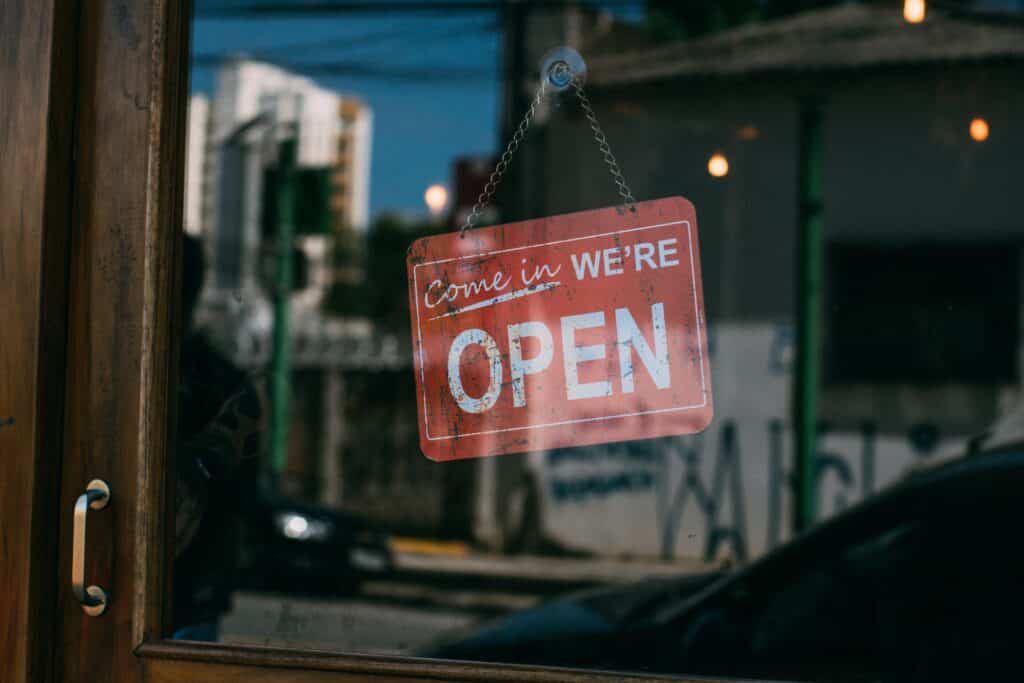Yelp Statistics & Facts Your Local Business Should Know
For local businesses, Yelp is the most prominent user review site on the internet and has become a household name in the process.
Yelp is the leading local guide for real word-of-mouth on everything from local boutiques and electricians to roofers and dentists. In some communities, consumers rely on Yelp to make spending decisions. If you’re a local service provider, you can use Yelp to learn more about your customers and manage your online reputation.
In this article, we will review powerful statistics about Yelp and its use cases, should you choose to claim your business listing on the site.
Many review companies fall short when it comes to helping local businesses manage Yelp reviews. Luckily, Signpost is here to help. Request a demo and take your Yelp reviews to the next level.
Yelp at a glance
In case you’re having second thoughts about whether to claim your business’s page on Yelp, here are the statistics to nudge you in the right direction. Please note that all of these statistics are dated as of December 31, 2021, and they are sourced directly from the Yelp site itself.
Yelp was founded in July 2004 and launched as Yelp.com in October that same year. It quickly grew to be a prominent review platform, hosting a number of business categories for new customers to browse when on the hunt for a specific service.
With over 33 million unique mobile installations and 244 million cumulative reviews, it’s no surprise that ‘Yelpers’ (the term used to refer to members of the Yelp community) check for reviews and comments from other customers before patronizing a business.
In fact, 71% of Yelpers offer positive recommendations for businesses on the platform. That’s great for a business’s online reputation management—it could be for yours, too.
Reviewed businesses by category/industry
Which business types garner the most customer reviews on the platform? The good news is that home and local service businesses top the list, which means that if your business isn’t on Yelp, you’re missing out.

Source: Yelp
61% of reviews are about service-based businesses, with the remaining 39% in restaurants, retail & other sectors.
Home and local services top the list at 18%.
What does this mean for your business?
This stat is impressive, because it means a majority of the businesses using their business profile to grow are your competitors. It also means that your customers are likely to write you a positive review if you encourage them to do so.
If you’re not utilizing Yelp, you’re missing out on the opportunity to reach numerous potential customers who are actively searching for your business on the Yelp app.
Yelp users are happier than you think!
Some business owners are nervous about putting themselves out there on platforms like Yelp. What about the risk of negative reviews? What if potential customers and other unique visitors visit your profile and one or two low Yelp ratings influence their purchasing decisions in a negative way?
These are questions at the top of most small business owners’ minds when they engage on social media and review platforms. Here’s the catch—Yelpers are a lot happier, and generous with ratings, than you’d think.
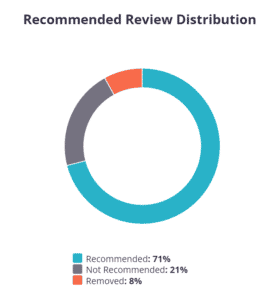
Source: Yelp
71% of the businesses on the platform have mostly ‘recommended’ reviews. Recommended reviews are not to be confused with positive reviews, but recommended reviews are ones that are deemed by Yelp as credible. Only 21% are not recommended and 8% are removed from the platform itself.
And that’s not all. The star rating distribution is positive too.
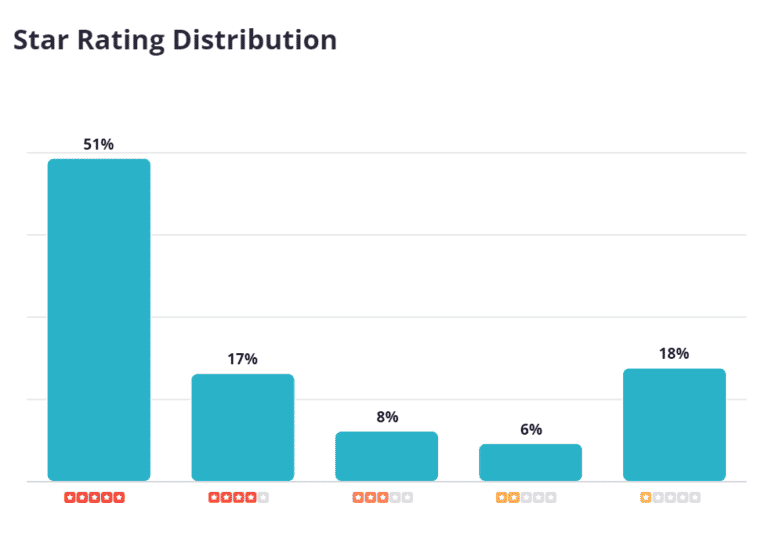
Source: Yelp
Only 24% of ratings on Yelp are 2 stars and lower. A whopping 51% of total ratings on the platform are 5 stars. 17% of ratings are 4 stars, which is still pretty great when you’re considering metrics.
What does this mean for your business?
If you’re focused on delivering quality service and giving your customers the best experience, you really have no reason to worry about negative reviews.
The statistics paint a positive picture: Provide good services and your star ratings, as well as the number of reviews you receive, will grow, highlighting your business’s ability to deliver and getting your business’s name out there to other prospects.
Yelp users
Now, let’s talk demographics.
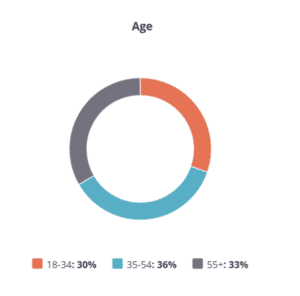
Source: Yelp
Age-wise, 18-34-year-olds account for 31% of the Yelp user community. The highest segment is 35-54-year-olds who cover 36%, with the 55+ community accounting for 33%.
As you can see, it’s pretty evenly split.
What does this mean for your business?
Most home service businesses cater to a mix of homeowners and business owners. Homeowners could be a mix of the retired and elderly community or young new couples.
The even spread of ages among the users gives you a fair shot of finding your target customers on the platform. The slight edge of 35-54-year-olds can favor those service businesses specifically located in more residential neighborhoods.
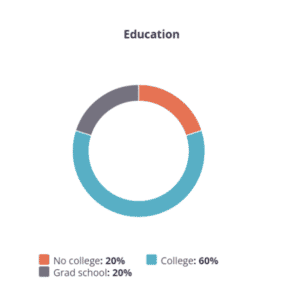
Source: Yelp
Education statistics indicate that 60% of Yelp users have been to and finished college. There’s an even split of 20% between those who haven’t gone to college and those that have finished grad school.
What does this mean for your business?
The education level of your target audience can alter the way you position your business and brand on the platform. You can more effectively assess their knowledge levels and provide more information, or less, on the technical details of what your business does and the services you offer.
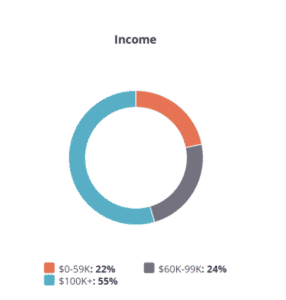
Source: Yelp
Income levels are an important segment to consider. 22% of Yelp users make $0-$59K a year with a close 24% in the $60-$99K income bracket.
However, over half of Yelp users earn $100K or more a year. This means that the majority of Yelp users are in the weather income bracket.
What does this mean for your business?
This can help you more effectively price your services and understand how much disposable income your customers can spare for your services. Of course, you should match this with other factors, like the neighborhood and communities your business serves.
For example, if you operate a plumbing or roofing business in an affluent neighborhood, customers will probably fall into that $100K a year bracket and may be willing to pay more for your services.
Using Yelp for Businesses - 4 Quick Tips
Now that you’ve seen the statistics to back up the benefits, are you ready to get started on Yelp?
While you are building and improving your business profile, keep these top tips in mind:
Claiming your listing: If your business isn’t already claimed, do so immediately. This allows you to add information and photos, respond to reviews, and customize your profile.
Never pay for reviews: Yelp is pretty good at detecting fake reviews. They even have a team dedicated to tracking down paid review writing service providers. It’s also ethically wrong to pay for reviews, so avoid giving into this practice.
Respond to every review (even negative ones): Responding to reviews shows that you care about what people think of your business and have nothing to hide. Negative reviewers may re-evaluate their rating if they see that you made good faith efforts to resolve their issues. Even if they don’t change their mind, other customers will appreciate seeing how you handle problems.
Keep your profile up-to-date: Update your profile with accurate hours, prices, and relevant information whenever possible. Keep it consistent with other listings as well (e.g. Google Business, your Facebook Business Page, etc.)
Ready to Get Started on Yelp? Let Signpost Help!
Yelp has always been built on the power of personal recommendations. There is no better way to drive sales than a glowing endorsement from someone who your potential customer trusts.
Signpost helps connect the dots between how customers are finding you online and when they call your business.
If you need review management software for your business without the headache, Signpost is a cost-effective solution. Request a demo today.

